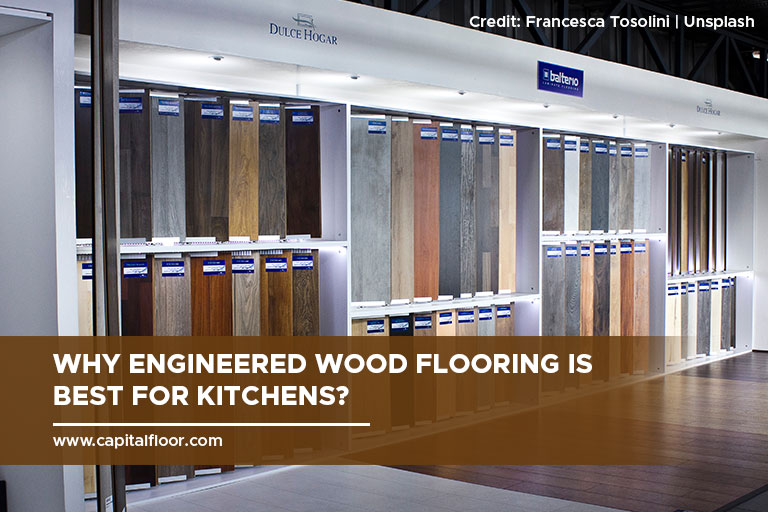Our showroom is open to the public. Please click HERE for more details.
Our showroom is open to the public. Please click HERE for more details.

While stone or tile flooring is the popular choice for kitchens, wood is also a viable option. However, conventional hardwood may be challenging to upkeep in humid kitchen conditions. Luckily, engineered wood flooring does not face this problem. It is durable, low maintenance, and provides various style options. Engineered wood flooring for the kitchen is the ideal choice if you wish to give your kitchen a timeless feel.
To achieve a cohesive design, consider matching the style of your kitchen cabinets with your engineered wood flooring. Kitchen cabinets are a crucial element that significantly impacts the overall look and feel of the room. You can easily find top-quality kitchen cabinets online that match your flooring, making it easier to achieve a coordinated design. With its durability, low maintenance, and design options, engineered wood flooring is an excellent choice for your kitchen.
So, what makes engineered wood flooring the best for your kitchen?
Engineered wood flooring has a significant advantage in its durability compared to traditional hardwood floors. Its construction involves several layers of ply that are bonded together using high-quality adhesive, resulting in a highly stable and long-lasting core. The plywood core is then covered with a top layer of veneer made from authentic hardwood, making it easy to install different shades of wood flooring without worrying about warping. Also, unlike traditional hardwood floors, engineered wood does not expand or contract due to moisture exposure, making it an ideal flooring option for high-moisture areas such as kitchens.
If you’re wondering how to clean engineered wood flooring for the kitchen, you’ll be happy to know that they require very little upkeep to maintain their appearance. Although they can handle exposure to spills and moisture daily, following a regular cleaning routine is essential. To clean your engineered wood floors, minimizing the amount of additional moisture that comes into contact with the material is best. Avoid using harsh chemicals and floor wipes, and instead, opt for a slightly damp mop to remove surface stains. A soft-bristled brush or vacuum cleaner can effectively remove crumbs and other debris. If you need to use cleaning agents to tackle tougher stains, make sure to use solutions formulated explicitly for wooden floors. It’s also a good idea to dilute the cleaning solution to prevent damage to the veneer finish.

Installing hardwood flooring can be time-consuming and expensive, but engineered wood flooring is a more convenient option, with fewer limitations for complex floor plans. Engineered flooring is ideal for floating installations, which involves laying down flooring materials over an underlay without attaching anything to the subfloor. This method securely attaches individual planks and provides a smooth finish, making it efficient for installing various styles of wood flooring, including long planks, Versailles panels, herringbone, and chevron.
In addition to saving time, floating installation eliminates the need for fixtures such as screws and nails, preventing any damage to the premium flooring during installation. Moreover, this method avoids the use of toxic adhesives and chemicals, making it an environmentally friendly option that helps maintain clean air quality within the home.
Even though engineered flooring only contains a small amount of solid wood, it can still be maintained and refinished in a similar way to traditional hardwood floors. If your engineered wood planks have a thick veneer, you can sand the surfaces and apply finishes and stains as needed. When selecting engineered wood flooring for a kitchen, choosing a product with a thicker veneer is recommended, which provides more flexibility for maintenance and protection against everyday wear and tear.
To ensure you have the option to sand and stain your flooring in the future, it’s important to choose a product with a thick veneer. An average of 0.5mm of surface material is removed during each sanding task. If you have flooring with a veneer thickness of 2mm or more, you can carry out several sandings during the lifetime of your flooring.
Selecting suitable flooring material is a crucial aspect of renovating a kitchen. Besides choosing a visually appealing option, you also need to consider the ability of the material to withstand heavy usage and the extreme temperatures common in the kitchen. Capital Hardwood Flooring offers reliable expertise, high-quality options, and a comprehensive range of services for engineered hardwood flooring in Toronto. Get in touch now by calling 416-536-2200!